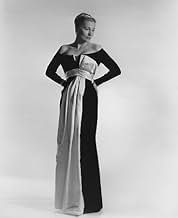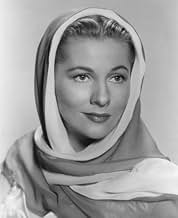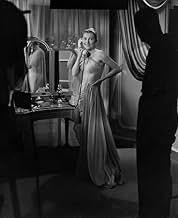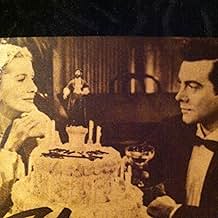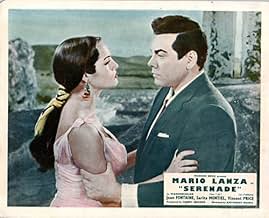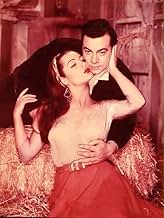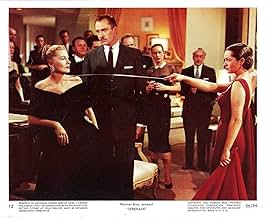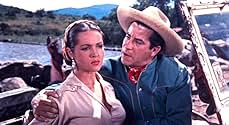Aggiungi una trama nella tua linguaDamon Vincenti, a young vineyard worker, has a beautiful tenor voice and dreams of becoming a great opera singer. He debuts at Lardelli's Italian restaurant in San Francisco, where he is spo... Leggi tuttoDamon Vincenti, a young vineyard worker, has a beautiful tenor voice and dreams of becoming a great opera singer. He debuts at Lardelli's Italian restaurant in San Francisco, where he is spotted by Kendall Hale, a society girl who enjoys launching young artists while making them ... Leggi tuttoDamon Vincenti, a young vineyard worker, has a beautiful tenor voice and dreams of becoming a great opera singer. He debuts at Lardelli's Italian restaurant in San Francisco, where he is spotted by Kendall Hale, a society girl who enjoys launching young artists while making them her lovers before dumping them after use. Damon is no exception to the rule: he becomes fa... Leggi tutto
- Regia
- Sceneggiatura
- Star
- Juana Montes
- (as Sarita Montiel)
- Accident Witness
- (non citato nei titoli originali)
- American Woman
- (non citato nei titoli originali)
- Opera Attendee
- (non citato nei titoli originali)
- Iago in 'Otello'
- (non citato nei titoli originali)
- Russell Hanson
- (non citato nei titoli originali)
- Shepherd Boy in 'L'Arlesiana'
- (non citato nei titoli originali)
Recensioni in evidenza
Let's get the quibbles out of the way first. Injudicious editing has made some of the scenes appear silly and illogical. The speed with which Lanza becomes obsessed with Joan Fontaine seems absurd, and the ending could have been so much better. Would that the scenarists had had the courage to follow more closely the James Cain novel on which this movie is based, but then again, this was Hollywood, 1955. Had the movie been made without the censorship constraints of, say, a mere ten years later, it could have been a masterpiece. All I can say is, read the novel and you'll see what I mean!
I would also criticize Anthony Mann's direction at times. Re-takes of some of Lanza's hammier moments should definitely have been made, and the film lacks (at times) the full dramatic treatment that its subject deserves. Re-takes of Lanza's Nessun Dorma and Di Quella Pira should also have been made. In both arias he sounds uncharacteristically strained, and in each case a second take would have sorted out the problem.
Quibbles aside, Lanza's acting is often outstanding (the Ave Maria scene, for instance, is a revelation). Vincent Price, Lanza's acid-tongued and hilarious manager in the movie, later remarked off-screen how impressed he was with the tenor's dedicated approach to his acting. Sarita Montiel is also outstanding in her role as a fiery Mexican bullfighter's daughter, providing Lanza with his best-ever leading lady.
But what makes this film a vocal masterpiece is Lanza's singing. La Danza, Torna a Surriento, Amor Ti Vieta, O Paradiso, the Otello Monologue (Dio! Mi potevi scagliar...) and the heart-rending Lamento Di Federico are all astonishing feats of singing. By 1955 Lanza's voice had darkened into a lirico spinto tenor that often borders on the dramatic. It is rare indeed to hear a tenor with such baritonal fullness AND a ringing tenorial top. (Eat your heart out, Placido Domingo!) Lanza For my money, the Otello Monologue is the pinnacle of Lanza's operatic legacy, and the finest recording of this aria. The scene in which it appears is also brilliantly acted by Lanza. As the critic John Cargher would later remark, Lanza's rendition of the Otello Monologue alone "would assure him of immortality."
All criticism aside, Serenade remains a source of immense pleasure to me, and it is richly deserving of far wider appreciation.
The script, by the otherwise excellent Ivan Goff and Ben Roberts, is a highly bowdlerized version of the book, retaining not much more than the title and character names. The film almost relentlessly exposes Lanza's considerable weaknesses as an actor in a way MGM never did. His singing, by contrast, is some of his best, especially in the scenes from Verdi's "Otello" with Metropolitan Opera great Licia Albanese as his Desdemona, a role she sang often at the Met.
As was his wont, Lanza's increasingly irresponsible, unpredictable behavior cost him the other two pictures in his Warners contract, even though "Serenade" was a box-office success. Apparently, Jack Warner was no more patient with him than Dore Schary had been. How ironic, then, that his last two films, made independently in Italy, were released in America by none other than MGM!
Lanza plays Damon, a vineyard worker with a golden voice who is discovered by a socialite, Kendall Hale (Joan Fontaine) who sets him up with a major voice teacher. With the help of Kendall and those around her, Damon is given a star buildup. The only problem is, Kendall is someone who encourages artists and then dumps them. Damon is in love with her, and on the night of his debut (we assume at the Met) singing Otello (a good choice for the story, but he never would have sung it until he was in his fifties at a minimum, if at all), she doesn't show up. He is so obsessed with her that right before he strangles Desdemona, he walks off stage, removes his costume and makeup, and goes to Kendall's place. What an idiot. His career in tatters, he goes to Mexico City and gets a job as Don Ottavio in Don Giovanni. But he's having a nervous breakdown. (No wonder - the role is completely wrong for him.)
Damon winds up ill and is brought back to health by a family which includes Juana (Sarita Monteil). With her help, Damon gradually feels strong enough to try singing again. But can he?
Lanza had a beautiful natural voice. Technique wasn't his strong suit -he scooped a lot and tended to oversing - but he brought opera to the common man. Before him, opera singers in films had been divas and divos - Jeanette MacDonald, Grace Moore et al. - but Lanza always played the truck driver with the beautiful voice. There were comments here on this site that his voice had darkened - frankly, at 34, that shouldn't have happened yet. As a person ages (we're talking 40s and 50s here) the vocal cords thicken and often, the middle voice warms up and becomes stronger, and some of the top goes.
Joan Fontaine, at nearly 40, was a stunning woman with a beautiful, slim figure. At this point in her career, she was playing the society woman, often in roles too young for her, as in "Beyond a Reasonable Doubt." But the sweet, naive girl of Rebecca had turned into the rich woman with an educated speaking voice and cool looks. Unlike other actresses of her age, Fontaine managed to eek out more years in good films than some of her counterparts because of this change in image. She does a great job as the cold Kendall. As Juana, Sarita Monteil is beautiful and her passion and intensity are a great contrast to Fontaine. The gowns in the film were gorgeous for both women.
Mario Lanza was a tragic figure, possessed of a beautiful voice and a natural tendency toward stockiness. Due to the pressure on him to lose weight, his crash dieting and drinking eventually affected his heart. In fact, there was nothing wrong with his appearance or his very likable, relaxed screen presence. But, as with Judy Garland, Louis B couldn't leave it alone. Lanza was a problematic individual, difficult to work with and someone who sexually harassed his female costars. He was his own worst enemy, but what a legacy.
Lo sapevi?
- QuizWarner Brothers bought the screen rights to the book in February 1944 and over the next 10 years various people were associated with it. At one point Ann Sheridan and Dennis Morgan were set to co-star and later Michael Curtiz was set to direct.
- Citazioni
Damon Vincenti: Hey! Are you hiring a singer or a bookkeeper?
Lardelli: Oho, he IS a tenor!
- ConnessioniReferenced in Apprenticing a Master - Neil Sinyard on the Tin Star (2024)
- Colonne sonoreNessun dorma
(uncredited)
from "Turandot"
Music by Giacomo Puccini
Libretto by Giuseppe Adami and Renato Simoni
Performed by Mario Lanza
I più visti
- How long is Serenade?Powered by Alexa
Dettagli
- Tempo di esecuzione2 ore 1 minuto
- Proporzioni
- 1.85 : 1
Contribuisci a questa pagina



